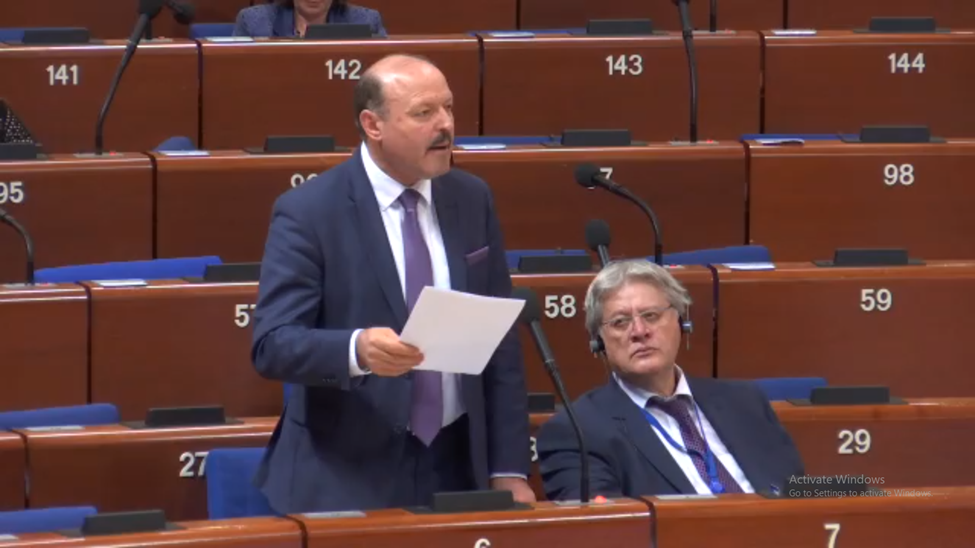
Tuesday, July 3, 2018
The Council of Europe Asks for Better Protection for Children and their Families
The Parliamentary Assembly of the Council of Europe (PACE) reaffirmed
on Thursday the 28th of June the right of children to be protected from
all types of violence as they adopted a resolution based on a report by ECPM MP and Board Member Valeriu Ghiletchi (Republic of Moldova). At
the same time, they underlined the right children have not to be
separated from their parents against their will except when it is
absolutely necessary and in their best interest. The report has been
adopted with an enormous majority of 43 against 2 with 14 abstentions.
Several ECPM MPs took the floor to support the report. ECPM
congratulates Mr Ghiletchi for this great achievement.
Mr
Ghiletchi opened his speech in the plenary debate by saying that: “The
well-being of children across Council of Europe member States is of
particular interest to me as a father, grandfather and politician, and I
have been considering one of the most far-reaching interventions that
the State can make into family life: the removal of children from their
parents and into an out-of-home placement. The report’s findings are
important to us all, because the family is the fundamental building
block of society, and international law is clear that the State should
intervene and separate a family only in the most exceptional
circumstances, because an unwarranted intervention can have a
devastating impact on family life.”
He added that the case that
prompted this report was a decision taken by Barnevernet, the Norwegian
child welfare services in 2015. In that year, five children from a
Romanian-Norwegian family, including a three-month old baby, were taken
into care by Barnevernet, in what were widely seen to be troubling circumstances.
Even though the children were returned to their parents, as a result of
the adventure of the Bodnariu family, many similar cases were brought
to light. Mr Ghiletchi made more discoveries during his fact-finding
visit to Norway. He found out that several procedural safeguards that
were built into the child welfare system have not been successful in
practice. Instead of fostering relationships with children and families
to ensure that they are adequately helped, the agency follows a
bureaucratic approach that in many cases allows abuses to happen.
ECPM
MP Ronan Mullen (Republic of Ireland) added that even though “this
report grew out of certain unfortunate events that happened in Norway,
but it is not a report about Norway. No country in the Council of Europe
is above providing us with teaching moments and learning moments about
how we can improve our defence and vindication of human rights,
particularly those of the most vulnerable among us, who of course are
the children of our societies…... As has been mentioned, the recent
international coverage of the separation of children from their families
at the southern border of the United States has led to justified
international criticism of policies that break up families for dubious
reasons.”
Finally, ECPM MP Pavlo Unhurian (Ukraine),
called Council of Europe (CoE) Member States to end “all abusive
practices, including the removal of children from parental care at birth
and proceeding with adoptions without parental consent.” He added that
“removing children should be seen as a last resort, and it must be
ensured that it is done for the shortest possible time and when a child
is subject to a real risk of serious physical or psychological harm.
When children are placed in alternative care, their religious, ethnic
and cultural background, as well as sibling bonds, must be considered.”
The adopted resolution highlights that despite the existence of clear standards in this area of children’s rights, there are still problems with their application in certain CoE Member States in decisions on child removal, adoption, placement and reunification. Therefore, further actions to bridge the gap between these standards and their implementation are needed. It also calls for openness and transparency in the child welfare systems of each country. Moreover, all personnel involved in removal and placement decisions must be properly trained. The primary consideration of all actions concerning children should be their best interests in accordance with the United Nations Convention on the Rights of the Child.
In cases where children have been removed from the family home, the resolution stipulates that Member States should ensure that such decisions are a proportionate response to a credible and verified assessment by competent authorities. This decision should also be subject to judicial review that there is a real risk of actual and serious harm to the children involved. Finally, when children are placed in alternative care, religious, ethnic and cultural background as well as sibling bonds must be considered.
For those who are interested, please find the full debate, as a transcript and a video